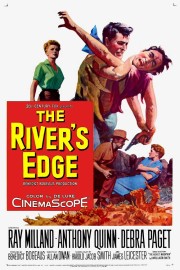The River’s Edge
**This piece was written during the 2023 SAG-AFTRA strikes. Without the labor of the actors currently on strike, the movies being covered here wouldn’t exist.
It’s always interesting to see how filmmakers adapt film noir into different genres. Here, director Allan Dwan brings the hard-boiled atmosphere and narrative of film noir to the west, and it’s a nice fit for what becomes a three-character road movie where motivations, and choices, are in question from one moment to the next.
We see Nardo Denning (Ray Milland) head his way west after stealing a million dollars. A hardened criminal, we see him trying to find someone to help him over the border. We also meet Ben Cameron (Anthony Quinn) and his wife, Margaret (Debra Paget). Life on the ranch is not great for them, and we feel like there’s some tension, even when they show affection with each other. When Nardo comes to them, there’s more to he and Margaret than meets the eye, and it’s going to play out as Ben leads them into Mexico.
The screenplay by Harold Jacob Smith and James Leicester is very stripped down and plays into some familiar tropes of noir and western, but where we find ourselves captivated with “The River’s Edge” is the ever-changing dynamics between Nardo, Margaret and Ben. Margaret is the femme fatale, and we are constantly questioning her loyalties. You see, she was Nardo’s lover before a stint in prison. Now, with Ben, she seems to want to settle down, but we still see that she’s got that fire between her and Nardo. But is fire enough? Right up to the end, we see that she is torn between these two men, and the performances between the three actors are the highlight of the film.
Dwan was a workmanlike filmmaker, by all estimations. He made over 100 films, and was a director who worked within genre. I haven’t seen anything else of his yet, but I’m curious to see some other work from him. Here, he understands what is needed from him, and the story, as it moved forward. This might actually have one of the most compelling endings of all of noir, because it shows that people may not the sum of their basest desires, and even if they appear wicked throughout a situation, there might still be good in them. That doesn’t mean everything will come out good for them in the end, though; fate always has a stay in how a story plays out.










